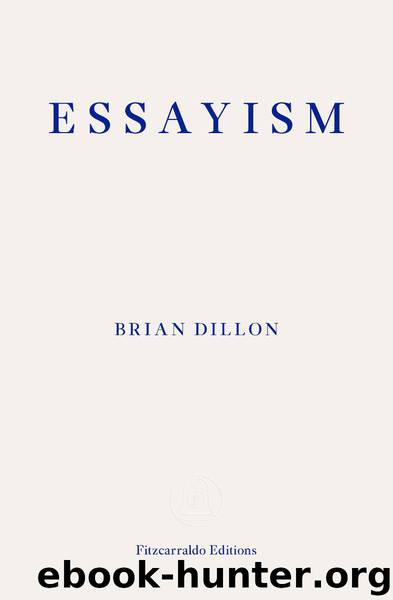Essayism by Brian Dillon

Author:Brian Dillon [Brian Dillon]
Language: eng
Format: epub, azw3
ISBN: 9781910695425
Publisher: Fitzcarraldo Editions
Published: 2017-04-11T04:00:00+00:00
¶ On the detail. Is it possible generally to love the particular, universally to admire the individual instance? To say: I’m not interested in specificity, only in specifics? I cannot stand that clumsy academic veneration of the sovereign particular that pronounces itself on the side of the object or of materiality, at the sheer expense of objects and materials. If you’re this much invested in things, I want to say to the object-oriented ontologist and the new materialist, how come your writing is such a pallid repetition of theoretical tendencies from half a century ago, and in no way the rigorous adventure with the discrete or peculiar that you imagine it to be? How can you be so committed to inhuman thisness or thatness, yet so oblivious, so exasperatingly removed, when it comes to this or that actual example? A philosophy of the object without objects, a materiality without materials – what good are these to anyone except the intellectually immature and overreaching, of whom assuredly I have been one?
Nowadays I would much rather read the plainest – they are hardly ever plain, not really – description of a thing than its most erudite or ‘radical’ theorization, in which the thing vanishes. Except, except (of course) I also want metaphors, by which the object may be quite occluded in comparison with something else, anything else. I want the detail, and I want the halo of affinities and correspondences that surrounds it. I want this point in space that is irreducible, but I cannot help admiring the way it sets off all these other points – ‘sets off’ in the sense of illuminating by comparison or contrast, and ‘sets off’ too in the sense of: explodes, detonates, unleashes. The detail is only a detail because of what it implies about the rest – or what it sucks into itself from the surrounding whole.
The Irish writer Maeve Brennan is probably an odd figure to invoke when I try to focus my blurred thoughts about details and particulars. Even by generous standards Brennan was a minor writer in her lifetime – she was born in 1917, moved to New York aged seventeen, and died in 1993 – though she has been recovered from the ignominy of her end (alcoholism, poverty, mental illness) and celebrated in recent decades. Brennan’s fiction, which is mostly set in her native Dublin, is quiet and spare and precisely imagined. But it is her essays I love: the short pieces she wrote for The New Yorker between 1954 and 1981 and which were signed ‘The Long-Winded Lady’. In these Brennan, who was wholly without sociological ambition or even much curiosity about New York – most of the city was still mysterious to her, she claimed after thirty-five years there – essayed small sharp portraits of life in the streets, restaurants and residential hotels of the metropolis.
In a typical essay the Long-Winded Lady is abroad in the city in the afternoon or early evening, perhaps on some errand but more likely drifting from lunch to dinner, watching other pedestrians and the patrons of cheap eateries.
Download
This site does not store any files on its server. We only index and link to content provided by other sites. Please contact the content providers to delete copyright contents if any and email us, we'll remove relevant links or contents immediately.
The Rules Do Not Apply by Ariel Levy(4943)
Bluets by Maggie Nelson(4534)
Too Much and Not the Mood by Durga Chew-Bose(4319)
Pre-Suasion: A Revolutionary Way to Influence and Persuade by Robert Cialdini(4196)
The Motorcycle Diaries by Ernesto Che Guevara(4069)
Walking by Henry David Thoreau(3940)
Schaum's Quick Guide to Writing Great Short Stories by Margaret Lucke(3362)
What If This Were Enough? by Heather Havrilesky(3297)
The Daily Stoic by Holiday Ryan & Hanselman Stephen(3287)
The Day I Stopped Drinking Milk by Sudha Murty(3180)
The Social Psychology of Inequality by Unknown(3009)
Why I Write by George Orwell(2933)
Letters From a Stoic by Seneca(2779)
A Short History of Nearly Everything by Bryson Bill(2675)
A Burst of Light by Audre Lorde(2582)
Insomniac City by Bill Hayes(2533)
Feel Free by Zadie Smith(2466)
Upstream by Mary Oliver(2377)
Miami by Joan Didion(2354)
